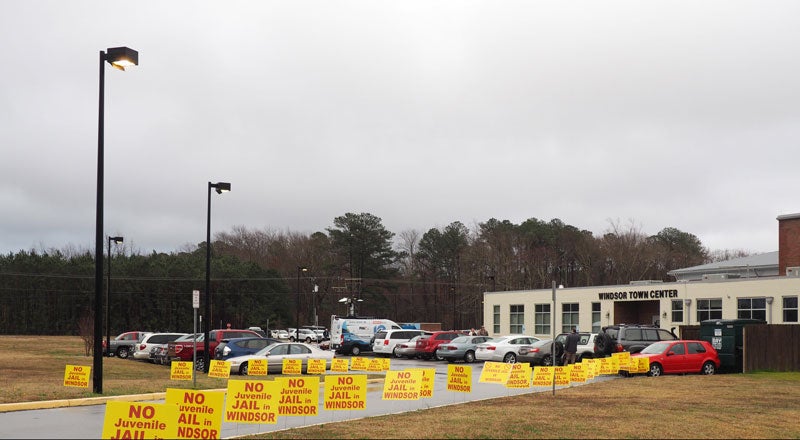Opposition to juvenile correctional center continues
Published 7:11 pm Friday, March 22, 2019

- Stephen Faleski | Tidewater News
WINDSOR
According to the Isle of Wight County Board of Supervisors’ bylaws, residents are not permitted to speak during citizens’ time on matters that have already been put to a public hearing, but that didn’t stop the residents of Windsor and the surrounding area from showing up in force at the Windsor Town Center on Thursday to continue their opposition to a juvenile correctional center proposed to be constructed about one mile south of the town.
Anticipating another large crowd after watching the boardroom fill to standing room only in February, the supervisors had made the decision to move their March 21 meeting to the Town Center during a work session on March 7. Before anyone could have their say on Thursday evening, County Attorney Bobby Jones informed the board members they would need a motion to suspend the aforementioned bylaw rule, which was made and passed unanimously.
Many of the same people who had spoken during the public hearing last month did so again, including Volpe Boykin of Carrsville, Dick Holland of Windsor and Valerie Slater, representing the organization Rise for Youth. A few who hadn’t spoken at the February meeting, such as Dan Shelton of Windsor, also took the opportunity to make their concerns and opinions known. He referred to the entire Shirley T. Holland Intermodal Park where the correctional center is to be located as a “boondoggle,” and suggested that citizens band together to take legal action against the project and the board.
Unlike the public hearing in February, at which there had been a few comments in support of the project, the sentiment residents in attendance on Thursday concerning the correctional center was universally negative. The only other matters on which residents spoke that evening were the proposed Isle of Wight County Schools budget for 2019-2020, and one speaker who presented a petition to the board suggesting it support renaming the city of Franklin’s airport, which is located in southern Isle of Wight County.
Prior to opening the floor for citizen comments, County Administrator Randy Keaton gave the board an update on the county’s negotiation of a proposed agreement between the county and the Virginia Department of Juvenile Justice. If signed, the agreement would deed 20 acres of land along Walters Highway (U.S. Route 258) to the DJJ for the purpose of constructing a state-run, 60-bed juvenile correctional center on the site.
According to Keaton, DJJ representatives have agreed to include language in the agreement limiting the proposed facility to 60 beds. The DJJ has also reportedly agreed receive input from a citizen’s advisory committee and the Board of Supervisors concerning the facility’s outer perimeter screening. However, it has reportedly rejected the board’s request to limit the center to housing only youth under age 18.
The DJJ facility will house youth ages 14 through 21, Keaton said. At its March 7 work session, the board had also discussed limiting the facility to lower-risk individuals, at least until DJJ staff are fully trained to run the prototype school-campus-style facility. While the DJJ has not agreed to the proposed restriction on types of offenders, it has assured the county that it will not populate the facility until staff have been fully trained. Keaton added that the DJJ plans to populate the facility gradually as juvenile offenders come into the DJJ’s custody rather than transferring offenders from the DJJ’s existing Bon Air correctional facility in Chesterfield County.
The county administrator added that per his conversations with Isle of Wight County’s commonwealth attorney, Georgette Phillips, he has learned that individuals in Virginia who are charged with violent crimes such as rape and murder are typically tried as adults and, if convicted, sent to an adult facility rather than one of the type proposed for the Windsor area. Additional offenses that would likely move a juvenile into the adult system include felonious injury by mob, abduction, malicious wounding, malicious wounding of a law enforcement officer, felonious poisoning, robbery, carjacking, forcible sodomy and object sexual penetration.
Still unresolved, among other details, is the county’s request for some type of payment from the DJJ in lieu of taxes, since state-owned facilities are exempt from municipal taxes. At the March work session, Board of Supervisors Chairman William McCarty said that such reimbursements already exist for properties owned by local governments that are transferred to the state for adult facilities run by the Department of Corrections. However, Assistant County Administrator Don Robertson said the DJJ does not currently have the authority to grant such a payment. If the county wishes to pursue payment in lieu of taxes, he said, it would need to do so via the General Assembly.
At that same work session, some supervisors had also been taken aback by provisions in the DJJ’s draft contract that stated the county, in addition to gifting the 20 acres and contributing $500,000 toward extending water and sewer service to the property, would foot the bill for some of the pre-construction site work. This would include razing the two houses on the property, closing the two on-site septic systems, performing any needed environmental remediation and closing all but one well, which would remain open for use by the construction workers.
McCarty said at that time that he felt the board should stay firm with its offer of $500,000 toward utility costs and not agree to any additional costs for site work.
Included in the county’s latest counter-proposal is an offer to raze one of the two houses — a two-story — at the county’s expense since the county has already begun the process. But demolition of the other — a ranch house — would be the responsibility of the state. Robertson said that the county has not yet received a formal response from the state regarding this counter-proposal.





